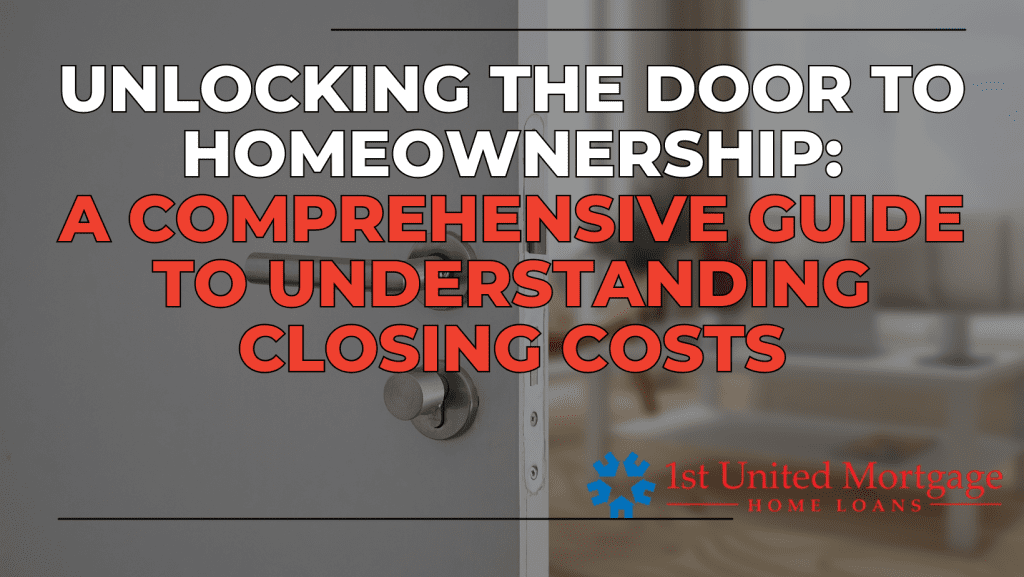
The journey to homeownership is an exciting adventure, but it’s important to be well-prepared for the twists and turns along the way. One crucial aspect that often catches first-time buyers off guard is the realm of closing costs. These additional expenses, separate from the down payment, play a significant role in finalizing your mortgage and getting the keys to your new home. In this guide, we’ll delve into the intricacies of closing costs, helping you navigate this crucial phase of the homebuying process.
What Are Closing Costs?
Closing costs encompass a variety of fees associated with finalizing your mortgage. These fees cover services and expenses required to complete the home purchase transaction. They are typically in the range of 3% to 6% of the total loan amount. For example, if you’re securing a mortgage of $200,000, you can anticipate closing costs ranging from $6,000 to $12,000.
Who Bears the Burden of Closing Costs?
Both buyers and sellers share the responsibility for closing costs, but in most cases, the lion’s share falls on the buyer. However, savvy buyers can negotiate with sellers to cover part of these costs, making homeownership more financially manageable.
Seller concessions, though generous, come with limitations. The percentage a seller can contribute depends on the loan type, down payment, and occupancy status. For conventional loans on primary residences, the seller can contribute up to 3% for down payments less than 10%, 6% for 10% to 24.99%, and 9% for 25% or more. Similar restrictions apply to second homes, while investment properties cap seller concessions at 2%.
A Closer Look at Common Closing Costs
Understanding the components of closing costs is vital for informed decision-making. Here’s a breakdown of some common expenses you might encounter:
- Application Fee: Some lenders charge an application fee to process your loan request, usually up to $500. This fee may be separate or serve as a deposit for future closing costs.
- Appraisal: An appraisal, ranging from $300 to $600, determines the property’s value and safeguards against overpaying. This is crucial for both buyers and lenders.
- Attorney Fees: In certain states, an attorney is necessary for closing. Attorney fees vary by location and cover coordination and paperwork for the title transfer.
- Closing Fee: Paid to the escrow company or attorney conducting the closing meeting, this cost varies by state and depends on whether an attorney is required.
- Credit Reporting Fee: To pull your credit report and assess your credit score, lenders charge a fee ranging from $10 to $100.
- Escrow Funds: Funds reserved for property taxes, homeowners’ insurance, and mortgage insurance, typically two months’ worth, held in a special account by your lender.
- Homeowners Insurance: Coverage against property damage, often requiring a year’s worth of premiums at closing, costing approximately $50 per month for every $100,000 in home value.
- Loan Origination Fee: Covers loan processing and underwriting, typically around 1% of the loan amount.
- Lender’s Title Insurance: Protects the lender from title claims, usually between 0.5% and 1% of the mortgage.
- Owner’s Title Insurance: Optional but recommended, it covers buyers in various scenarios, costing between 0.5% and 1% of the purchase price.
- Property Tax: Up to a year’s worth may be required at closing, contingent on your home’s location and value.
- Survey Fee: In some states, a land survey may be necessary before closing, costing $400 to $1,000.
- Title Search Fees: Ensures the property doesn’t have claims or liens, with costs ranging from $200 to $400.
Strategies to Manage Closing Costs
Managing closing costs requires strategic planning and negotiation. Here are some tips to help you navigate this financial terrain:
- Shop Around for Lenders: Explore various lenders to find competitive rates and lower fees. Choose a lender that offers favorable terms to reduce your overall closing costs.
- Negotiate Seller Concessions: In buyer’s markets, sellers may be more willing to contribute to closing costs. Understand the limits based on your loan type and negotiate concessions accordingly.
- Understand Your Loan Estimate: Three business days before closing, your lender provides a Closing Disclosure outlining all closing costs. Review this document thoroughly to understand the specifics of your financial commitment.
- Estimate Property Taxes: Research property taxes in your area to anticipate potential costs. Consult public records and the seller to gauge property tax obligations.
- Explore Fee Reductions: Negotiate certain fees with your lender and explore options for reducing expenses. Some lenders may offer free rate locks or waive specific fees based on your financial situation.
Opening the Door to Your New Home
Understanding closing costs is paramount as you embark on the exciting homeownership journey. Thorough research, careful negotiation, and strategic planning empower you to navigate this financial landscape confidently. By unraveling the complexities of closing costs, you unlock the door to your new home with financial clarity and peace of mind.
For personalized guidance and expert advice on navigating the complexities of closing costs, contact 1st United Mortgage at (931) 548-1985 or visit our website. Our dedicated team is here to support you on your path to homeownership.
